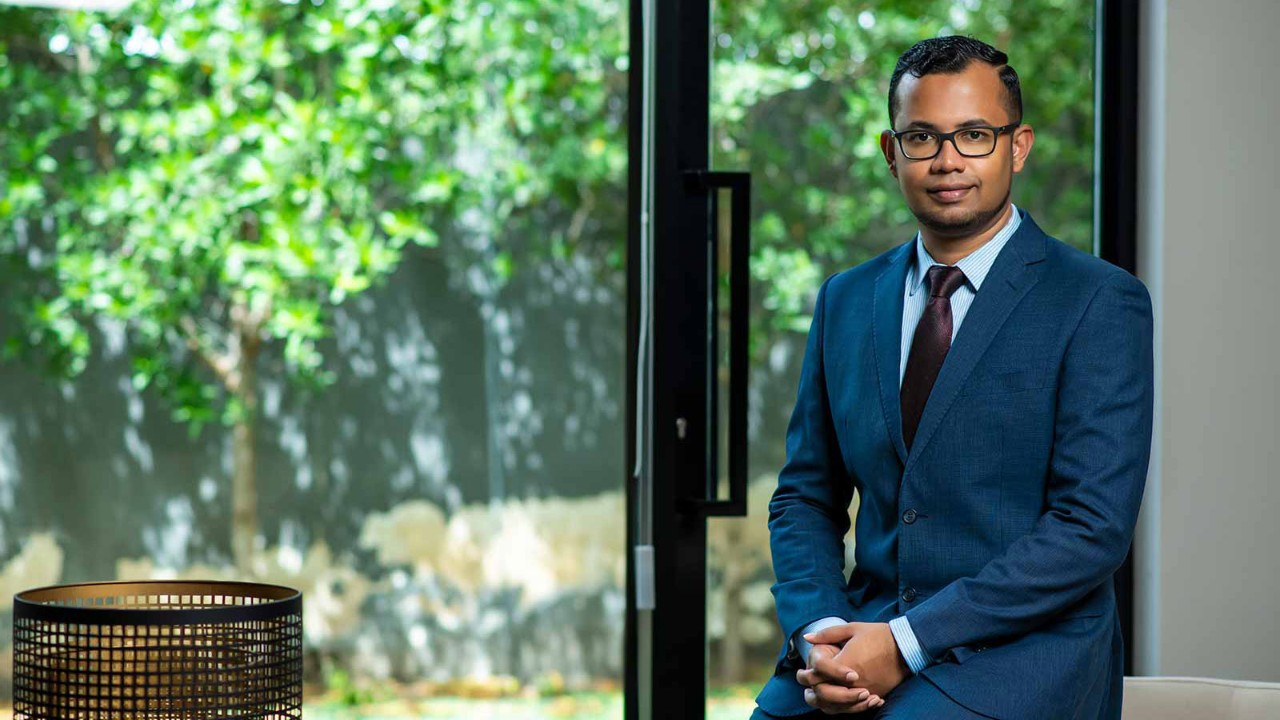
Azam Ahamed’s arrival as the new head of finance at Biyaq Oilfield Services in Oman was, by any measure, a baptism of fire. Having spent the previous four years in his native Sri Lanka working for London Stock Exchange Group on the financial planning for a new tech facility – where he won a CEO award for excellence – he found himself tapping all his professional reserves to deal with a cyber attack on the Gulf oil company’s systems as well as the business implications of the pandemic.
It was a true test of his resilience and professionalism, but he came through it and four years later is now Biyaq’s chief financial officer. He describes that time as a ‘major challenge’, adding: ‘But it helped me learn how to overcome challenging situations, how to be prepared and mitigate such risks in the future.’
He encountered what are once-in-a-lifetime events for many accountants

As Biyaq’s finance chief, Azam has had to familiarise himself with a whole new industry. Biyaq group, with about 250 employees and a turnover of US$50m, has a division providing well services; a ‘blending plant’ supplying chemicals to the petroleum industry; a ‘liquid mud’ processing plant that recycles byproducts from oil and gas drilling; and a division providing well intervention tools and services. The company has also invested in oil exploration.
Big move
Azam had at first hesitated to take the role. After all, there is no core energy industry in Sir Lanka, so his familiarity with the sector was scant. But he had wanted to ‘get out of my comfort zone, get into new territory and challenge myself to see whether I could perform well’.
He soon found out. In his first year at Biyaq he encountered what are once-in-a-lifetime events for many accountants.
He had just moved his family (at the time he had two children, aged five and two) from Colombo to Muscat when Covid-19 hit. The pandemic caught Biyaq in the middle of seeking finance to construct a liquid mud processing plant.
The facility was part of a new plan to offer oil companies a way to clean up waste product from the drilling process. It would recycle drilling fluids and contribute to cutting the local industry’s carbon footprint while supporting the move toward sustainability goals. It would also add an important new dimension to Biyaq’s service portfolio.
As the pandemic seared its way across the world, a changing view of investment risk caused the finance industry to draw down its shutters. Azam persisted with his business case, moving from one bank to another while making the argument for the plant’s commercial prospects and its contribution to sustainability.
‘We secured finance at a time when banks and investors were extremely cautious’
CV
2020
Head of finance, then CFO, Biyaq Oilfield Services, Oman
2016
Manager – business finance and planning, London Stock Exchange Group, Sri Lanka
2013
Assistant manager, then manager, Bharti Airtel Lanka, Sri Lanka
2010
M&A associate consultant, PwC, Sri Lanka
2007
Finance executive, Hayleys, Sri Lanka
Turmoil-resilient
The deal that was eventually agreed was his ‘biggest achievement’, he says. ‘At the height of the market turmoil, when both banks and investors were extremely cautious over funding, navigating this process and securing the necessary finance, I think, was a significant challenge, and we were able to achieve it.’
Azam says success came by focusing on building confidence in the project through a sound financial model and compelling KPIs. ‘Investor confidence was the most important thing to secure the funding,’ he adds.
That success, though, did not come out of nowhere. Azam had spent nearly three years in practice with PwC where he worked on 30-odd M&A projects, an experience that had allowed him to hone his deal-making skills.
‘Project financing – or M&A and new investments – those catch my attention more than the usual day-to-day tasks, to be honest,’ he says.
‘Your knowledge leadership is more important than anything else’
Cyber attack
And if that deal, struck at a time when credit markets were closing down, weren’t enough to stamp his mark on Biyaq, two months after Azam’s arrival a ransomware attack on the company’s computer systems resulted in the loss of three years of financial data.
Fearing that paying the ransom would simply generate demands for more money, Biyaq refused to pay. Azam had to manually restore the data, working for weeks until midnight and later to restore financial transactions.
New to the country and inexperienced with cyber attacks, Azam says the episode took a heavy toll on him. So much so that he confesses there were moments when he thought he should quit and return to Sri Lanka. What kept him going was knowing that Biyaq had put its faith in him – ‘a certain trust’, as he puts it. ‘I took it as a personal challenge, to prove to myself that I can overcome this situation, and I did.’
Liquid mud
Four years on and the energy industry is deeply ingrained in Azam. ‘Overall, it’s an exciting time to be in energy, with a lot of opportunities for those who are interested in contributing to a sustainable future,’ he says.
Biyaq’s liquid mud plant is a major step in literally cleaning up the oil industry. Azam says: ‘Investment in the plant demonstrates our commitment to exploring new technologies and processes that minimise the environmental impact. We recognise the need for collaboration across industries, governments and communities to address climate change challenges.’
There is much to do. Biyaq will continue looking for opportunities and Azam will be leaning on his expertise. It is an expertise rooted in what may be accounting destiny – Azam’s mother taught maths and his father accounting. While there were early ambitions for Azam to be a doctor, that idea faded. ‘I realised I was very good at numbers,’ he says.
The ACCA qualification that he started in Sri Lanka during a three-year pre-PwC spell with conglomerate Hayleys, hitting the books and attending class in the evenings and weekends, was a turning point. ‘It has proven to be one of the most pivotal decisions of my career,’ he says. ‘The comprehensive and demanding curriculum has imbued me with invaluable expertise, enabling me to fulfil the expectations of my role as a CFO.
‘Once you get to a certain position, like head of finance or CFO, your knowledge leadership is more important than anything else.’
Biyaq Oilfield Services
Founded in 1996, Biyaq is a supplier to the oil and gas sector in Oman, providing well services, oilfield chemicals and fluids, and chemical water shut-off solutions. Sister company Wahiba Energy offers well intervention services and oilfield tools, while another sister company, Black Gold Integrated Solution, operates the liquid mud plant for Petroleum Development Oman.


